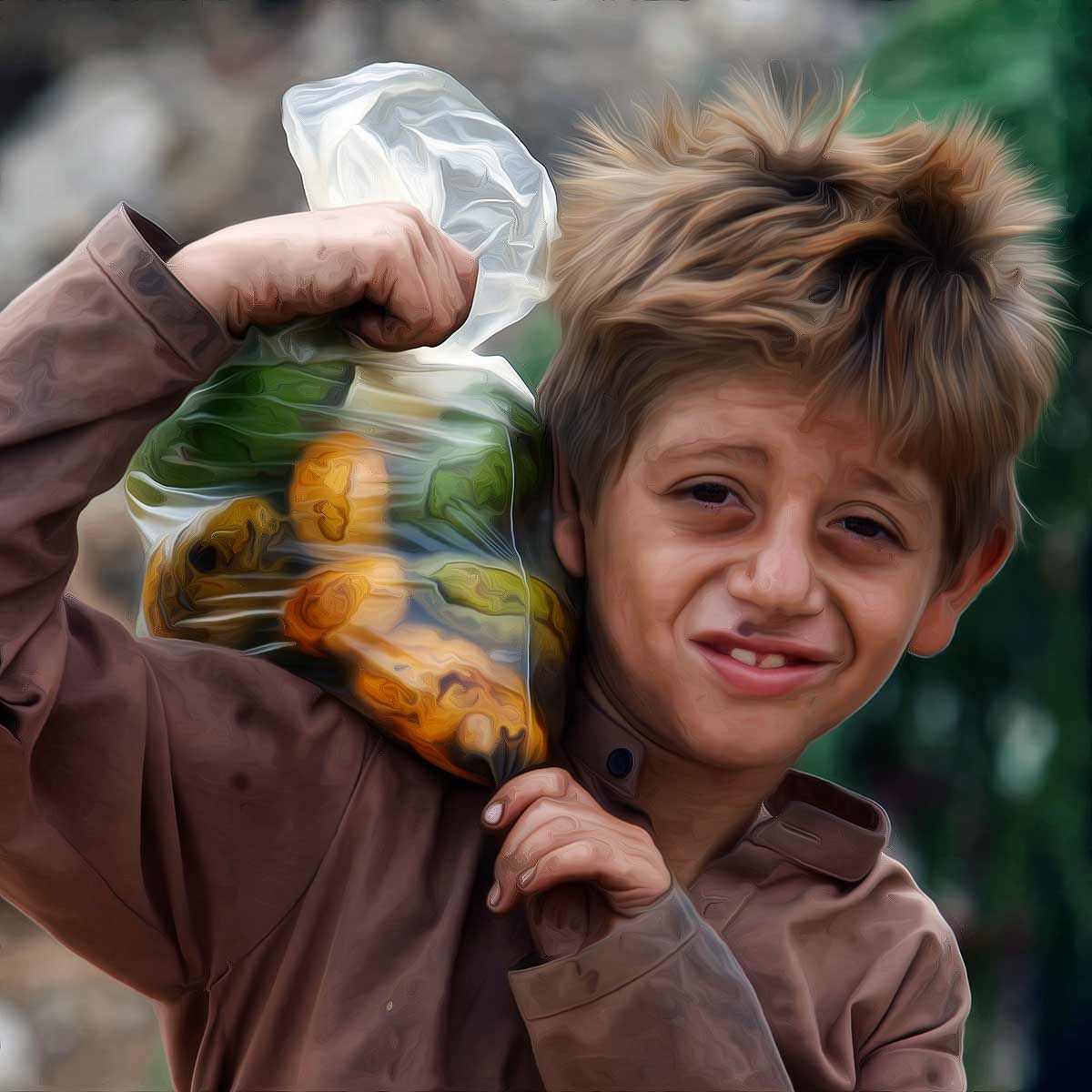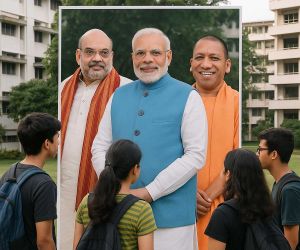MORE COVERAGE
Twitter Coverage
Satyaagrah
Written on
Satyaagrah
Written on
Satyaagrah
Written on
Satyaagrah
Written on
Satyaagrah
Written on
JOIN SATYAAGRAH SOCIAL MEDIA
"Poverty is not just a statistic; it's a lived reality": World Bank report reveals that 95 million Pakistanis are living below the poverty line, amid rising inflation, the institution emphasizes the need for urgent reforms to stabilize Pakistan's economy

In the latest findings, the World Bank paints a grim picture of Pakistan's economic landscape, emphasizing the dire need for immediate reforms. The nation, already grappling with economic constraints, now faces the daunting challenge of soaring inflation and navigating through one of its gravest economic downturns. Alarmingly, the data indicates that a staggering 95 million of its population are mired in the depths of extreme poverty.
|
In just a span of a year, the poverty rate in Pakistan has experienced a significant spike, escalating from 34.2% to 39.4%. This translates to an additional 12.5 million individuals being pushed below the threshold of the poverty line, set at an income level of USD 3.65 per day. To put it in perspective, about 95 million Pakistanis are currently enduring life in impoverished conditions, as highlighted by the World Bank.
In a proactive move, the Washington-based financial institution unveiled a series of draft policy notes this past Friday. These notes, which were formulated with the collaboration of various stakeholders, are aimed at guiding Pakistan's imminent government as the nation steers towards a new election cycle. The revelations were brought to the limelight by The Express Tribune newspaper.
In a sobering statement, Tobias Haque, the World Bank’s principal country economist for Pakistan, commented, “Pakistan’s economic model is no longer reducing poverty, and the living standards have fallen behind peer countries.” This assertion underscores the urgency with which Pakistan needs to address and recalibrate its economic strategies.
In a disquieting revelation, the World Bank has highlighted Pakistan's deteriorating economic landscape. An alarming 95 million of its populace grapple with the harsh realities of extreme poverty, painting a bleak picture for a nation that once boasted a thriving economic model.
|
|
Just in a year, the percentage of poverty in Pakistan catapulted from 34.2% to 39.4%. This sharp incline has seen an additional 12.5 million people plummet below the poverty threshold, surviving on an income of less than USD 3.65 per day. “Pakistan’s economic model is no longer reducing poverty, and the living standards have fallen behind peer countries,” remarked Tobias Haque, the World Bank’s lead country economist for Pakistan. His words resonate with the despair and urgency the situation demands.
But the challenges don't just stop at rising poverty. As Pakistan teeters on the edge of an economic abyss, the World Bank's policy notes, prepared in collaboration with various stakeholders, come as a clarion call for Pakistan’s upcoming government. There is an impending need for reform, and the time for action is now.
Signaling out the 'sacred cows' of the Pakistani economy - agriculture and real estate, the World Bank underscores their urgent need for taxation. Wasteful expenditures that currently plague the system need trimming. The vision? Achieving economic stability with a rigorous fiscal adjustment equating to over 7% of the economy.
|
The World Bank's concerns align with ground realities. Citing issues such as an unsustainable fiscal situation, an overly regulated private sector, and challenges within the agriculture and energy sectors, it emphasizes these as key areas demanding the incoming government's attention.
The roadmap to recovery, however, is a challenging one. Suggestions from the global lender include immediately amplifying the tax-to-GDP ratio by 5% and curtailing expenditures by about 2.7% of GDP. Such strategies are not mere suggestions but necessities if Pakistan wishes to steer its floundering economy back towards fiscal prudence. This involves adopting measures to enhance the revenue-to-GDP ratio by 5%, which could be achieved by retracting existing tax exemptions and imposing heftier tax burdens on both the real estate and agriculture sectors.
As the sands of time rapidly slip away, Pakistan stands at a crossroad. It faces a daunting choice between heeding these warnings and making arduous, yet necessary, reforms or continuing on a path that could further imperil its already fragile economic state. The onus now lies squarely on its leadership, with millions of its citizens earnestly hoping for a better tomorrow.
|
Pakistan at a Pivotal Economic Juncture: World Bank's Alarm and Blueprint for Change
"The World Bank is deeply concerned about the economic situation of today," voiced Tobias Haque, echoing sentiments that reverberate with the dire straits Pakistan finds itself in. The grim reality of a nation grappling with profound economic and human development crises demands urgent introspection and action. As it stands, the country teeters at a critical juncture where transformative policy redirections aren't just encouraged, but imperative.
Najy Benhassine, the country director for Pakistan at the World Bank, perceives a silver lining in this looming cloud of economic turmoil. He believes that "this may be Pakistan’s moment for a significant policy shift." However, this potential metamorphosis requires confronting some uncomfortable truths.
Central to the World Bank's concerns is Pakistan's underwhelming tax collection performance. Despite having the potential to amass taxes equivalent to 22% of the GDP, the nation lags significantly with a disheartening current ratio of merely 10.2%. This stark disparity underscores a gaping chasm of more than half, an alarming situation that the World Bank is eager to address in its advisory notes.
To bridge this monumental gap, the global lender lays down a comprehensive blueprint. It advocates for the curtailment of distortive exemptions, anticipating that such measures could yield taxes equating to 2% of the GDP. Moreover, there's an emphasis on capitalizing on the untapped reservoirs of the real estate sector. By levying increased taxes on land and property, Pakistan could potentially accrue another 2% of its GDP in revenues. Not to be sidelined, the agriculture sector, another cornerstone of the Pakistani economy, is seen as a viable source to generate an additional 1% of the GDP.
The undercurrent of urgency in the World Bank's message is palpable. With each passing day, the weight of economic stagnation grows heavier on Pakistan's shoulders. As the World Bank charts out a course towards stability, the ball is now in Pakistan's court. The nation must decide whether it will rise to the challenge or be swept away by the inexorable tides of economic decline. Only time will tell if Pakistan seizes this pivotal moment in its economic history.
The World Bank's diligent assessment of Pakistan's economic situation continues to unravel multifaceted recommendations for the nation. Addressing the palpable exigency of the economic situation, the international financial institution is offering both immediate and long-term solutions.
|
|
One such immediate remedy revolves around streamlining financial transactions. The World Bank underscores the pivotal role of transparency in any robust financial framework. Thus, it has proposed the compulsory utilization of the CNIC (Computerised National Identity Card) for transactions, especially those involving assets. This strategy is not only designed to bolster accountability but also to deter illicit financial activities.
Furthermore, the bank zeroes in on the colossal expenditure that strains Pakistan's already strained coffers. Pointing to the superfluous energy and commodity subsidies, the World Bank posits the wisdom in curtailing these. Alongside, the introduction of a unified treasury account and the imposition of austere measures in the interim could cumulatively result in savings close to 1% of the GDP. This perspective gains further clarity when one considers that in 2022 alone, despite having deposits in commercial banks exceeding Rs 2 trillion, Pakistan shouldered a hefty Rs 424 billion in interest due to sovereign borrowings, a situation that the World Bank laments as a missed opportunity to utilize idle cash.
Looking beyond immediate alleviations, the World Bank's vista encompasses medium-term strategies too. It advises prudent reductions in federal development and current expenditures associated with provincial nature projects. Moreover, a vigilant scrutiny of loss-making entities and the bolstering of the quality of developmental expenditure could free up nearly Rs 1.4 trillion. When tallied, the total potential savings from these interventions could elevate Pakistan's economic health by 2.7% of the GDP.
In summary, the World Bank's roadmap for Pakistan is one of judicious financial recalibration. Whether Pakistan marches forth on this path or chooses an alternative route remains the looming question. What is evident, however, is that change is not just recommended but essential for Pakistan's economic resurgence.
 Support Us
Support Us
Satyagraha was born from the heart of our land, with an undying aim to unveil the true essence of Bharat. It seeks to illuminate the hidden tales of our valiant freedom fighters and the rich chronicles that haven't yet sung their complete melody in the mainstream.
While platforms like NDTV and 'The Wire' effortlessly garner funds under the banner of safeguarding democracy, we at Satyagraha walk a different path. Our strength and resonance come from you. In this journey to weave a stronger Bharat, every little contribution amplifies our voice. Let's come together, contribute as you can, and champion the true spirit of our nation.
 |  |  |
| ICICI Bank of Satyaagrah | Razorpay Bank of Satyaagrah | PayPal Bank of Satyaagrah - For International Payments |
If all above doesn't work, then try the LINK below:
Please share the article on other platforms
DISCLAIMER: The author is solely responsible for the views expressed in this article. The author carries the responsibility for citing and/or licensing of images utilized within the text. The website also frequently uses non-commercial images for representational purposes only in line with the article. We are not responsible for the authenticity of such images. If some images have a copyright issue, we request the person/entity to contact us at This email address is being protected from spambots. You need JavaScript enabled to view it. and we will take the necessary actions to resolve the issue.
Related Articles
- Ministry of External Affairs summons South Korea Ambassador over the pro-terror stance of Hyundai Pakistan on Kashmir and expressed strong displeasure of the Government: Korean Minister Yong exhibit regret
- Hyundai India promotes disintegration of Jammu and Kashmir from the Union of India: Started blocking netizens after they question whether they endorse their Pakistani counterpart’s views on Kashmir
- Hyundai celebrating ‘Kashmir Solidarity Day’ had been facing nationwide boycott calls in India: Issues second statement that post by Pakistani counterpart unauthorised, expresses ‘regret’ for pro-terrorist stand
- Car manufacturers Celebrating Pro-terrorism stand on Kashmir has invited massive criticism from National auto dealers’ body: Urges the Ministry of Heavy Industries & SIAM India to seek clarifications
- Pakistani Media reporting abduction, forceful conversion as a consent marriage with the Muslim abductor in SIndh
- 20 YouTube channels and 2 websites blocked by the Indian Govt for having links with Pakistan to spread anti-India propaganda
- ‘Debt trap’ policy of China to undermine sovereignty of nation-States has begun to backfire
- Dhimmitude is nothing but a Stockholm Syndrome
- "Anyone can speak Troll. All you have to do is point and grunt": Weeks after Alt news co-founder got out on bail, #ArrestZubair trends again as Mohammed Zubair works in tandem with Pakistan to build “Khalistan” narrative against cricketer Arshdeep Singh
- Srinagar Police arrested local hybrid terrorists affiliated with the terror outfit The Resistance Front (TRF), an offshoot of Lashkar-e-Taiba: Recovered arms, ammunition, and incriminating material
- "The idea of cultural relativism is nothing but an excuse to violate human rights": In the promise of getting a food ration a young Hindu girl Bhagwati was drugged and brutally raped for two days by autorickshaw driver Khaled in a flood-hit area of Sindh
- "Extinction isn't pretty, especially when you know it's coming and do nothing about it": A tribe in Pakistan living in mountains of Hindu-Kush, practice ancient form of Hinduism "Kalash" are facing an existential crisis & being forced to convert to Islam
- "The wicked envy and hate; it is their way of admiring": ‘A way of Jihad’ against India said Imran Khan on cricket match between the two teams, Pakistani cricketers have a long history of anti-India & anti-Hindu statements, was supposed to be sport, right
- Pakistan’s Hindus face a brutal reality as the HRCP report reveals rising mob attacks, forced conversions of girls, temple demolitions in Karachi, biased courts jailing innocents, and a state ignoring extremists like TLP, driving some to flee to India
- "However deep you dig a well it affords no refuge in the time of flood": Half of Pakistan is under water which led to the catastrophic floods and claimed more than 1000 lives, emergency declared as a deadly flood affected more than 33 million people

























